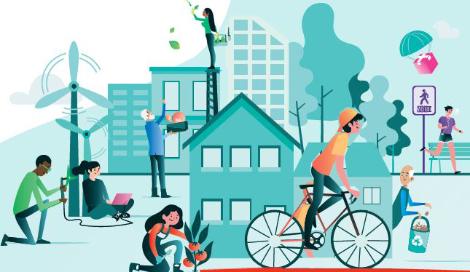Tomorrow my territory 11 Growing food in my territory
Urban agriculture
November 2019
Agence pour l’Environnement et la Maîtrise de l’Energie (ADEME)
The 20 factsheets in the collection « demain MON TERRITOIRE » have been designed to give candidates and elected officials practical keys to take action, to open up the field of possibilities based on the experiences of other elected officials, from small towns to conurbations, large urban areas or sparsely populated areas. In the four corners of France, both in metropolitan France and in the French Overseas Territories, many of them are taking action, together with the players in their territories, to prepare for the future by taking action to mitigate climate change and adapt to its effects. With its knowledge and presence throughout the country, ADEME supports them with its tools, activities and financial aid.

Why support the development of urban agriculture?
In full development all over the world, urban agriculture encompasses a wide variety of practices: from open field projects to above-ground cultivation in aquaponics, permaculture projects, livestock breeding or grazing. Recreational and symbolic, urban agriculture carried by inhabitants allows contact with a certain form of nature and seasonality and encourages citizen participation. It can also play a role in the circular economy and encourage short circuits for a few commodities. As an educational tool, it allows consumers to reappropriate the food production phase, to have access to local products and to encourage them to change their diets by moving towards greater sustainability. However, urban agriculture is not a miracle solution for feeding city dwellers: the most important agricultural challenges lie in preserving rural agriculture and soil quality, notably by fighting urban sprawl and certain farming practices.
How do you do it?
Urban agriculture projects should be considered as a link in the Territorial Food Projects (TFPs). These allow a global vision of the needs of the territory to push the most suitable projects.
-
Social and solidarity-based urban agriculture is promoted with the objective of food production while creating integration jobs and/or solidarity-based sectors. We promote the development of social and solidarity economy (SSE) projects and the involvement of citizens in financing (cooperative, participatory financing), volunteering and/or consumption (direct sales).
-
Support is given to projects arising from citizen and collective initiatives developing in a not-for-profit, non-profit sector and giving a large part to citizen participation: shared, educational, family gardens, collective hen houses, and also projects focused on awareness and education. These projects are driven by citizens themselves, by local authorities and even by companies wishing to mobilise their employees.
-
Circular economy approaches (reuse recycling) are being developed without using sophisticated or energy-consuming technologies.
-
We support initiatives for composting, sustainable water management (tanks, mulching, etc.), …
-
Service-based urban agriculture projects are stimulated for the development and management of public spaces: orchards, vineyards in parks and streets, eco-grazing to maintain spaces, setting up hives to improve pollination and help maintain domestic bees.